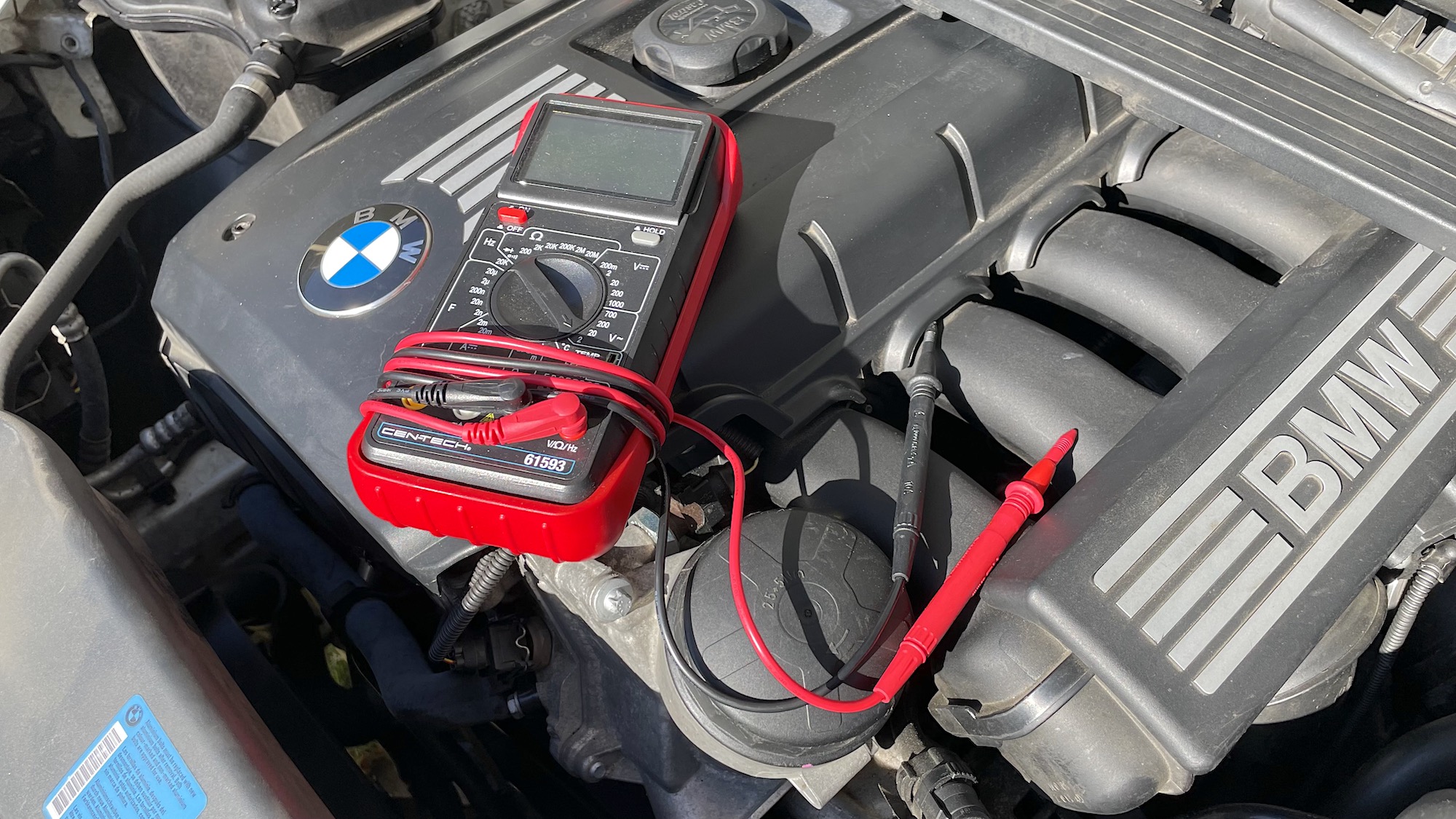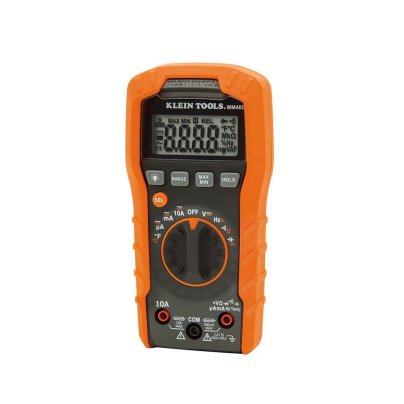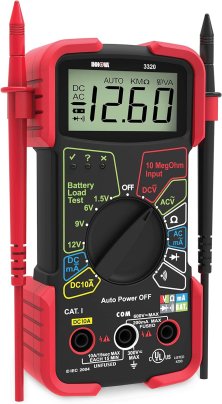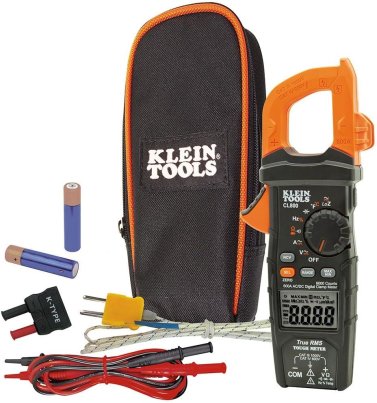We may earn revenue from the products available on this page and participate in affiliate programs. Learn more ›

One of the most useful devices you could ever spend your money on is a multimeter. Even the one that comes free with your purchase at the local discount tool store can be the defining difference between you getting something back up and functioning or throwing a good amount of money away on parts you suspect to be failing. Even if they seem like a specialty tool, they’ll come in handy in virtually any technical field. Mechanics, electricians, HVAC technicians, and so on are all likely to put a multimeter to use multiple times per day.
But because there is a variety available to you, picking one out isn’t as simple as it seems. Certain features compliment specific work fields while others are virtually useless to those outside of that environment. Luckily, getting up to speed is pretty straightforward, and we’re to give you some advice on making an informed decision.
Summary List
- Best Overall: Klein Tools MM400 Multimeter
- Best Value: Innova 3320 Auto-Ranging Digital Multimeter
- Premium Pick: Klein Tools CL800 Digital Clamp Meter
- Honorable Mention: Extech EX330 Autoranging Mini Multimeter
Our Methodology
To choose the multimeters on the market, we employed a comprehensive research methodology. We evaluated dozens of multimeters before choosing the top contenders. Although we haven’t personally tested these products, our selection is informed by consumer testimonials, expert reviews, discussions on relevant online forums, and our institutional knowledge of the automotive industry.
Some brands are already well-established in this niche, and priority was given to their products. However, other lesser-known brands were also evaluated. The main features taken into consideration were price, functionality, design, durability, reliability, and warranty. Multimeters were immediately disqualified from consideration if they were unreliable or had limited functionality.
Best Multimeter Reviews & Recommendations
Best Overall
Klein Tools MM400 Multimeter
Pros
- Rugged
- Easy to use
- AA battery-powered
Cons
- Not as extensive in features as some higher-end options, which seasoned users might not like
Klein makes its final entry on our list with an auto-ranging multimeter that’s great for general electrical work. Of course, it can read voltage, resistance, and continuity. That, in combination with the rugged design, already meets the criteria of many. It also features a thermocouple for reading temperature and an adapter to test transistors helping it to appeal to folks working with electronics and more. It’s a great all-around option, mainly because it goes at an incredibly competitive price point despite being attached to an industry-leading name. Of course, running on AAA batteries works to sweeten the pot as well.
This unit is a heavy hitter for hobbyists and weekend warriors, but it isn’t a high-end tool. Some professionals do get used out of it but note that it doesn’t compete with premium products with similar functions.
Best Value
Innova 3320 Auto-Ranging Digital Multimeter
Pros
- Slim with added corner armoring
- All the essential options
- Good price
Cons
- Not as extensive of a list of functions as other units
If you’re working under the hood, this is a good choice for you. We don’t say that solely because the brand has ties to Equus. The ability to perform a battery load test is going to come in handy for several jobs you’ll tackle on vehicles. Besides that, it has all the essential functions you’ll need for general electrical work both on cars and elsewhere. It also features probe holders on the sides and thick corner guards, complimenting working in tight spaces in an engine bay. Of course, the fact that it’s affordably priced will also help make its way to many tool collections.
This is handy for automotive work, but professionals may want to look elsewhere.
While this isn’t a bad tool for the money, it isn’t exactly in the league of high-dollar multimeters many rely on to make a living.
Premium Pick
Klein Tools CL800 Digital Clamp Meter
Pros
- Sturdy
- Circuit testing is a crucial option for some jobs
- Affordable
Cons
- Experiences issues in cold weather
- Occasional inaccurate readings
Not having to test a circuit in series works to prevent injury, or worse. That’s precisely why industry professionals need a clamp meter in their collection. If you already have an excellent multimeter to work with, this offering serves as a great addition to your collection. It’s an auto-ranging unit that can test voltage, resistance, continuity, capacitance, frequency, and even test diodes. It also comes with a thermocouple probe so that you can test temperature. Being as capable as it is, the price point is hard to knock. Many units of comparable stature run for much more, pricing themselves out of range for many folks.
“It’s good for the money” is a key phrase here. For the most part, it is a good tool, but accuracy and reliability are concerning. Most reviewers seem to like it, but many admit to issues regarding readings being slightly off and the unit struggling in cold weather.
Honorable Mention
Extech EX330 Autoranging Mini Multimeter
Pros
- Simple and compact
- The ability to test temperature
- Easy-to-use overall design and functions
Cons
- Inaccurate readings have developed over time
- Other options are more reliable in this price range
Extech is a solid brand to call on when you need a reliable multimeter but doesn’t want to break the bank. This particular model is an excellent example of how it balances quality and affordability. This is an auto-ranging multimeter with a range of necessary functions for working on electronics and general electrical jobs. This unit has twelve various tasks, including the ability to read temperatures with the supplied thermocouple, and can be used as a voltage detector. Despite being super capable, it has a relatively compact sizing that works to keep operation hassle-free.
Overall, the unit performs as it should, which isn’t a surprise to supporters of the brand. However, some reviews state that after a short amount of time, some significant issues with performance and function may arise.
Our Verdict on Multimeters
The Klein Tools MM400 Multimeter is our best overall multimeter. This is a tried and tested model from a trusted brand, built to last, and competent in all but the most extreme situations. But, if you need a reliable model that won’t break the bank, then check out our value pick, the Innova 3320 Auto-Ranging Digital Multimeter.
What are the different types of multimeters?
Analog Multimeter: Though they aren’t as prevalent in today’s day and age, analog multimeters are still available on the market. The primary difference between a digital multimeter and an analog multimeter is the display. These use a needle scale in place of an LCD. The digital models usually do have the edge when it comes to accuracy in readings and features. Still, the analog does a better job at displaying the speed of fluctuations in the current, which can prove to be very valuable in specialty fields.
Autoranging Multimeter: Like all things, voltage, ohms, and current are measurable in increments. Just like distance, those increments can be lumped into groups, which are known as ranges. An auto-ranging multimeter is a digital device that is capable of identifying what range a measurement exists within and automatically displays the reading for you. This makes using a multimeter far easier for beginners or those who don’t have the time or need to sit and sort through ranges while troubleshooting components.
Manual Ranging Multimeter: As opposed to an auto-ranging multimeter, the manual ranging design requires the user to select the proper range to obtain an accurate reading. The drawback is that you have to be familiar with these ranges and where they exist within the project you are working on to obtain a reading. The primary benefit is that one who is proficient in their field can generally get more accurate readings than they could from an auto-ranging multimeter.
Clamp Multimeter: A clamp multimeter has many of the same functions as other digital multimeters. Still, it has a distinct advantage in measuring the flow of electricity in a live circuit. The clamp is used to measure voltage, resistance, and so on within the wire passing through it. That eliminates the need to perform measurements in series, which can be potentially life-threatening.
What are key features of multimeters?
Proper Function: Even the most expensive multimeter you can buy will let you down if it can’t perform the function you need it to. Multimeters can provide measurements of multiple electrical circuit qualities, but they can’t all do the same things. For example, some can measure temperature while others cannot. What features are most important to have in a multimeter is dependent on what kind of work you perform. If you’re not sure what those features are, your best bet is to seek advice from someone in your field and who does the same kind of work.
Durable Design: Professional-grade multimeters are expensive, and replacing them is far more painful than the initial purchase. Of course, you want to take care of your tools, but accidents happen. That’s especially true for someone who’s crawling through attics, climbing ladders, or working around cars and in other harsh environments. Sure, there’s room for a ten-dollar multimeter in every toolbox, but if you’re relying on it to make a living, it’s best to buy one that can take a beating.
FAQs
You’ve got questions. The Drive has answers.
Q: What are multimeters used for?
A: Multimeters are used for a range of electrical tests. In short, they are useful in determining the status of an electrical circuit or to track down any significant issues within.
Q: What are your best multimeter tips?
A: While it’s essential to invest in a multimeter that can perform the functions you need it to, you don’t need to waste your money on one that can do more than that. We might not have the insight into what features are essential to techs in other fields, but we can give some guidance on what we think are the best automotive multimeters.
You’re going to work in the dark, and some multimeters don’t have a backlight. If you can, you should invest in the multimeter that has this feature to save your tongue and teeth from the back end of a flashlight.
A multimeter is just an extension of your brain. Without that, it’s just a hunk of plastic and circuitry. It’s up to you to familiarize yourself with diagnostic procedures and when to perform them. That said, we can offer up some advice on How to Test a Relay and How to Test Transmission Speed Sensors.
Again, multimeters can’t do everything, and you’ll need more diagnostic tools to get the job done. Test lights, socket testers, and voltage probes are all tools that complement a multimeter’s purpose and are worth having on hand. If there’s anything we learn from working with electricity, it’s that diagnostic tools are precious. For advice on devices like this for other projects, consider our guides to Infrared Thermometers and Moisture Meters.
Q: What is a multimeter and what can multimeters measure?
A: By definition, a multimeter is a test tool that can measure two or more values. At the very least, you can expect a multimeter to read voltage, resistance, and current. Any other functions it can perform is dependent on the model you select.
Q: What are the two types of multimeters?
A: You can lump all multimeters into the categories of analog and digital. However, digital multimeters can be broken up into the categories of manual ranging, auto-ranging, and clamp types. It’s best to familiarize yourself with all kinds to make an informed decision.


